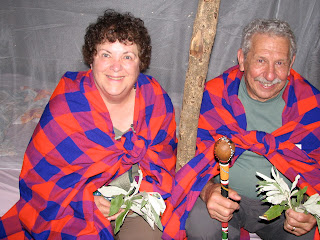At the suggestion of Tom, who'd been our friendly advisor planning this trip, we planned a visit to the Maasai village of Enkerere. The chief, Kipas, has known our outfitter, George, for more than a dozen years. Tom had suggested we buy a goat from the village and then have the goat roasted to share with the villagers. Originally we'd considered spending a night at the village in one of the guest huts, but we changed our minds when we realized there would be no electricity for our CPAP machines, plus the outhouse had not been completed. So we decided it would just be an afternoon visit.
The men of the village greeted us.
George had included the price of the goat in our safari. When we arrived at the village, the goat was tied to a tree.
Three of the villagers prepared the goat for slaughter. They laid the animal on branches and placed their hands on it. One of the villagers placed his hands around the creature's mouth to smother it. Chief Kipas said, "Some people would shoot the goat, but I don't believe in that."
If you're interested in observing this ritual, here's a video of it.
Two men prepared the fire to roast the goat. Just like the Boy Scouts do it, I think.
While the goat was being roasted, Art and I were taken to a hut in the village and, in a ceremony, given Maasai names and a blessing. My name is Nashipai (Happy Woman) and Art's is Oloshipa (Happy Man). I told Peter they should have named me "Woman Who Talks". Having been with me for over a week with my many, many questions, Peter just laughed.
This is the chief's mother. Her Christian name is Maria. She is 92.
The newly named Maasai couple.
The village of Enkerere has been moved and rebuilt in the last year. My understanding is that the new location is closer to the grazing grounds for the cattle, but I heard there might have been a lease involved. It's hard to know when ancient traditions and modern happenings are mixed.
The women danced for me, and I, as a new Maasai woman, was expected to join in.
The women set up the marketplace for their handicrafts. Art and I were the only buyers. As before, we bargained for the items we wanted. Then, after payment had been made, the woman presented us with several gifts - and several gifts to send to Tom, who they remembered from several years ago when he stayed at the village for a week. George, our outfitter, told me Tom had insisted on staying there, so George dropped him off. But he called Chief Kipas several times to make sure Tom was okay!
The roasted goat is being served.
Chief Kipas and I eat first.
The goat tasted good, but I didn't have any silverware or napkins! I decided licking my fingers was the best way to get the grease off.
Everyone in the village got a slice of goat meat.
The village has many cows, and they don't recycle the manure. We and the other adults were constantly brushing flies off ourselves. The kids were apparently able to ignore them.
We had brought school supplies and Tootsie Rolls to give out. I gave the school supplies to Chief Kipas, then the Tootsie Roll bags. The chief gave the candy out to the children. There were about 35 children, I think. Some of them came through the line more than once!
Peter and a friend waited by the vehicle while Art and I went with Chief Kipas to watch his cattle coming home at the end of the day.
The calf gets to nurse, and then the cow is milked. Such a contrast from the mechanized milking at the commercial dairy.
I decided not to try my hand at milking.
It was after sunset by the time we said our goodbyes to the chief and his villagers. I was grateful to be spending the night at the tented camp rather than in the village hut.















































3 comments:
Wow. I know a Masai woman named "Happy Woman," and she is that, indeed! What a fine adventure you had, Linda, and I am so glad you are sharing it with me. :-)
You are so adventuresome, and brave. I would be very uncertain about a visit like this. The Masai treated you like royalty!
I am in awe, I was holding my breath as I read...
Post a Comment